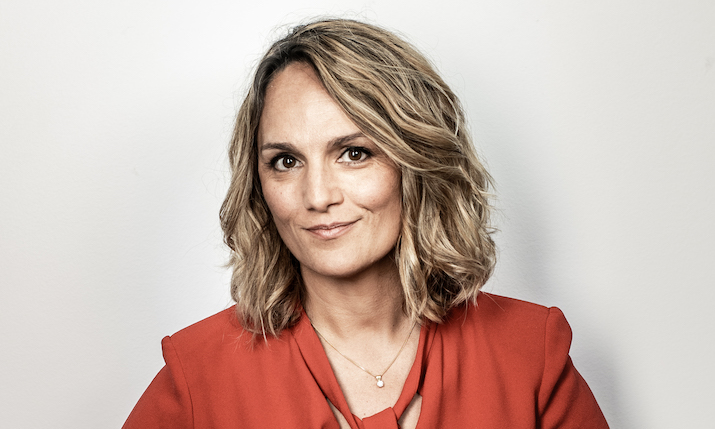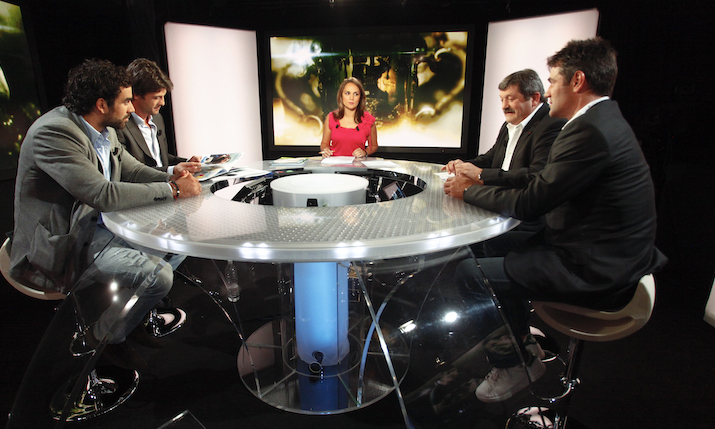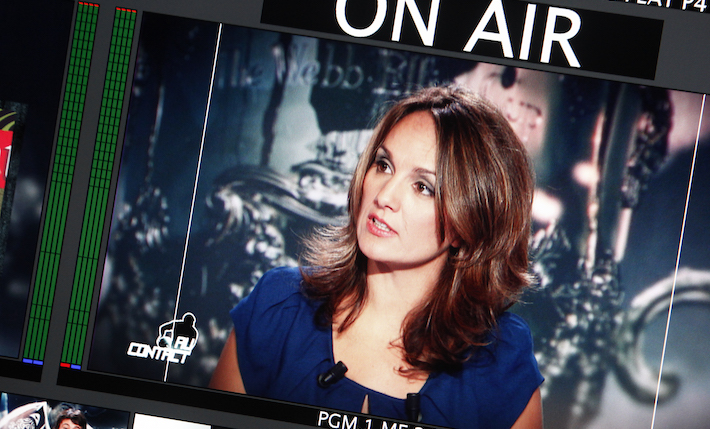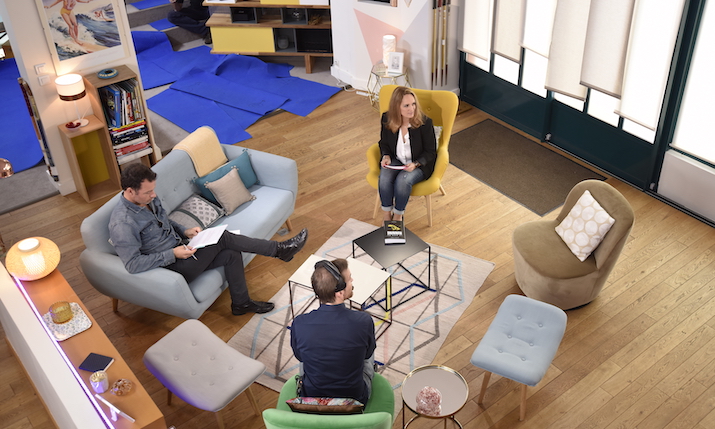Exceptional coverage: Warner Bros. Discovery Sports’ French director Geraldine Pons on excitement, Olympics and working hard

Pons: ‘To other women I say, feel comfortable with your expertise’
By Geraldine Pons, Warner Bros. Discovery Sports director for France
When I was young, my main dream was to become a TV journalist. I imagined working as a reporter, travelling the world with a microphone and camera, or hosting a CNN prime time show; I wanted to be in the very heart of the world to tell people what was going on.
I loved stories and how to tell them. I focused on TV because I always liked entertainment, the cinema, pictures and the work of pictures (colour, plans, shots, editing).
TV seemed to me to be the best media to express myself. Sports came to me later in my career; it was an opportunity that brought me into this environment. I never thought I could become a sports journalist and it’s been 22 years of sport now; it has become part of my life.
Obviously, being a woman in the early 2000s in a sporting environment was not too easy. But honestly, I never suffered a lot from this situation, not for too long at least! My colleagues and managers were, in general, very respectful and helped me a lot to evolve and feel cheerful, maybe because they saw that I worked more than anyone.

In her current role, Pons manages the editorial line within Warner Bros. Discovery Sports’ platforms
I put in a lot of effort to become a sports expert, and each time I made an error, I got back on the horse, like a rider who fells and gets back on it. But, for sure, I had to withstand embarrassment from time to time; some were critical about my appearance – especially when you get older or come back from motherhood – but I never felt dejected; on the contrary, I always have had resilience.
To other women I say, feel comfortable with your expertise; always work hard, even if you think you don’t have anything to learn, be sure that someone will also learn something from you. Any situation is a life lesson to make you stronger.
Be cool and never give up. Sometimes life is hard, but always see the good side of things, be positive and you will see life differently.
And, above all, stay true to yourself, be confident, believe in what you do. Don’t expect life to lead you somewhere by chance, somewhere you might not have chosen.
Many things draw me to a career in live sport. To feed the viewer and offer them the best content: to catch the emotion whatever it is, being there at the right time; tell stories in the best way possible; entertain them and inspire people, making them think broadly because sport can also change one’s vision of life.
From news to sport
After my degree, I studied for three years in preparatory classes to ‘grandes écoles’, integrating the best universities in France, then I joined a journalism school. I was 22, and at that time I was already a trainee for the local newspaper in Bordeaux, where I lived, called Sud Ouest, to which I often contributed as a writer.
“Be cool and never give up. Sometimes life is hard, but always see the good side of things, be positive and you will see life differently”
It was the 1990s and many channels were launched in France. It was a very motivating period for young people and after my journalism diploma, I applied to work for a new channel called LCI, which was the news arm of TF1. They offered me a three-month internship and on the last day, I was asked to become a freelancer for the main information service with a focus on medical news. It was a holy period where we could work 25 days a month and it lasted three years before they hired me in 2000.
I was producing features, hosting interviews, I did voiceovers for magazine shows, I was a live reporter for live events. After just a year, I hosted news programmes. That was my first experience with live television in a very challenging environment. I learnt a lot in this job, met very inspiring people, but I was stagnating in this role. I struggled and worked hard to integrate with the staff but once I was there, I wanted more.
I spent three years in news – from 1994 to 1997 as host and features producer (writing features and editing them). Then in 1998 the football World Cup was held in France. My career in sport began with this event. I enjoyed working on this so much as a news reporter.
This World Cup opened the field to new possibilities; women were ‘allowed’ to be part of the fiesta. It gave a new breath, a wind of freedom, suddenly all became possible, you could believe in a new future and break the barriers. Sport was not the preserve of men any longer.
During this competition, I was a reporter following the fans. I met a lot of people for my features, incredible people, happy to share these emotional moments together, and I loved that because sport has something magical. After the event, I went back to news. But for the first time I had worked on something I liked: the performance, the resilience and above all the happy endings. Sport is good vibes, inspiring stories, engaging values, and that was exactly what I wanted to do.
So in 2000, thanks to the opportunities at TF1, the sport service asked me to join them. I had a weekly slot for the main football show called Telefoot. I produced a three-minute format, it was a short segment which summarised all the football news of the week. I did this for one year and then started a new challenge.
Presenter to director
At the same time, Eurosport (which was part of TF1 at the time,) was looking for a show presenter and asked me to audition and I landed the role. So, I moved to Eurosport. I was the only female on the staff, presenting news shows. I then moved to events and magazine shows, including for the Rugby World Cup, a daily show on-site during Roland-Garros and live sequences in the studio for all sports.
In 2001, I took on a new role, but one with new colleagues and a new mission; that was a radical change. I was 28 and I was opening a new chapter in my life. Sport would become my domain of work, in a very male-dominated environment of experts who knew everything on every sport for super fans, who also knew everything on every sport!

Pons: ‘Sport is good vibes, inspiring stories, engaging values, and that was exactly what I wanted to do’
As I was the only woman, I soon realised that I would need to work harder than ever because sport was not my background, and I would not just be given any chance. It was not easy for women at that time to emerge through sport. Sport was a protected land, preserved for men, the ones who know sport – we, as women could not make any mistakes – but I worked a lot to get the expertise.
I’ve been evolving at Eurosport for 20 years now, from TV host, presenter, to producer, then manager. The arrival of Discovery was a turning point for me, as they named me director. I moved from manager to leader. I progressed to the sports director position in France four years ago; I had a strong vision for all the roles and the environment within the company. I had the experience, I had the expertise of sport and its environment.
Today, my role is to manage the editorial line within our platforms, which means the live (commentaries) and the non-live, all the content that goes on our platforms, creating formats and shows, finding news ideas and managing our journalists. I also hire talent, such as former athletes as co-commentators, for example.
I still have ideas, but now I want to guide the team on our values. I manage a team of 30 full-time journalists on our permanent staff, 50 freelancers and a similar number of talents.
Olympic ambitions
The changes of strategy, driven by digital, is the most challenging aspect of my job; moving from a heritage philosophy focused on linear and the traditional way of producing and broadcasting, to something more digitally focused, more entertaining, means you have to adapt and be flexible.
It’s a challenge to engage people in this transitional period, but it’s also stimulating when you succeed. I am also involved in a few think-tanks and organisations that think about sport globally. That’s also a challenge to spread the idea that sport is also social and I try to develop these items on health, social and cultural matters to propose something different as a traditional broadcaster. For example, social issues in sport; that’s why I created formats that inspire women.
I enjoy managing people, from journalists to athletes to production staff; it is a passion. I also love the freedom I have to express my creativity; how to tell stories and highlight stories, create new formats, develop new roles and a mission for people. I like to coordinate energies, skills, passions and put the right person in the right place.
Obviously managing the Olympics in the country that will welcome the next Games is the most motivating event I could ever imagine. Hosting the Olympic Games in your country is a great opportunity. We all aim to live this one time in our life, and it’s even more powerful when it’s in your city. For the first time in my career I will be at the very heart of the event.
We have big ambitions for France, that’s why we will deliver exceptional coverage: with experts in every sport, preview shows in the morning and debrief shows at night.

Pons has developed shows based on the social issues around sports
Our coverage will be presented from incredible places, with a team of reporters to give a flavour of the day and produce vast amounts of brilliant content to show how a city lives during the Games. We will also focus on performances using our expertise to tell great stories. We want to show what Paris is all about: arts, gastronomy, fashion and so much more, and we want to integrate sport in this environment.
A really exciting thing I did was create a show for Roland-Garros, a tournament for which we do not have live rights in France. It was very motivating to develop a one-hour show – without live footage – but we succeeded.
Our coverage of the Beijing Olympic Games was also very innovative, in terms of production, as we still had restrictions in terms of coverage, so we had to think of new ways to produce coverage, such as use of the Cube’s teleportation capabilities.
I must say I have worked on a lot of cool things, but a highlight is probably the creation of a show I presented, focused on social issues, sport and entertainment. It was quite new at that time, but we started from a blank sheet of paper to create a one-hour show with a team of experts and guests. We proposed sport exercises, discovered new sports, discussed social topics, we cooked live for sportspeople, we cross over into entirely different universes such as cinema and arts. That was a human adventure with a strong team
And, of course, being part of the main events in sport, presenting my shows in rugby, tennis, or skiing, feeling the adrenaline kicking in when you are live and when everything can happen.

